T-Island: the innovative concept of the Terranova’s training center
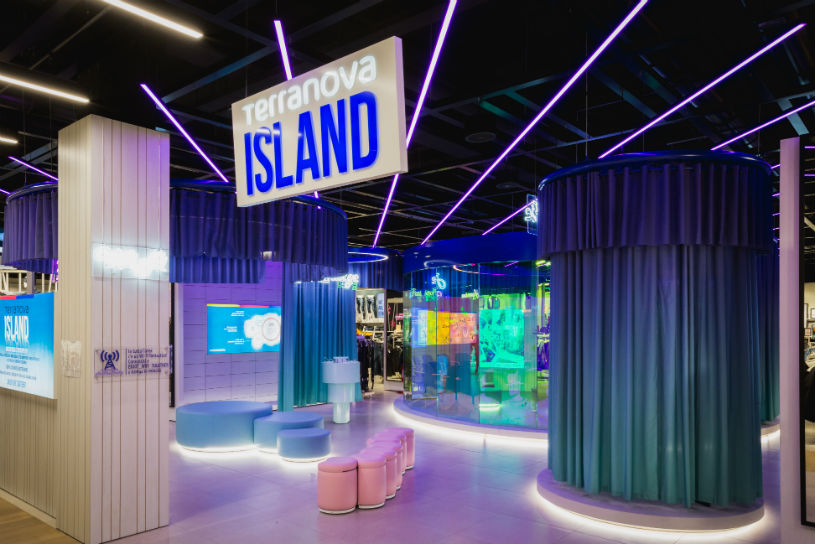
T-Island is the concept of the Terranova’s training center, designed to celebrate the 30th anniversary of the international fast-fashion brand. The concept challenges the traditional retail environment introducing a moment of leisure within a strictly commercial venue.
Some curiosities about the training center of Terranova brand in Pesaro:
1. T-Island: relaxation area and brand training center
2. Interview with Marco Vanucci, designer of the innovative Terranova Island
3. Some information on the Teddy Group
4. Conclusion
1. T-Island: relaxation area and brand training center
The T-Island project starts from the idea of creating a new space for customers in the Terranova store in Pesaro.
The idea has been made real by architect Marco Vanucci - founding director of OPENSYSTEMS Architecture in London - thanks to his talented perspective.
.jpg?width=900&name=img%20(2).jpg)
.jpg?width=900&name=img%20(1).jpg)
.jpg?width=900&name=img%20(3).jpg)
This completely new space has been designed to break the hustle and bustle of shopping and experience first-hand the brand’s laid back ethos.
The space is, at the same time, a workplace, a lounge area and a playground. Customers can discover, relax, experience the brand and its values through interaction and play while shopping.
All in line with the personality of the Terranova brand that is summarized in these three words: "Enjoy life together".
The staff can perform their training, attend meetings and workshops while being seen by and interacting with their customers. The design of the space fully embraces the brand’s joyful and playful way of life. In contrast with the straight lines of the surrounding store, T-Island applies the principle of space-filling curves and circles as a way to organize several activities within a constrained area of the store.
In contrast with the straight lines of the surrounding store, T-Island applies the principle of space-filling curves and circles as a way to organize several activities within a constrained area of the store.
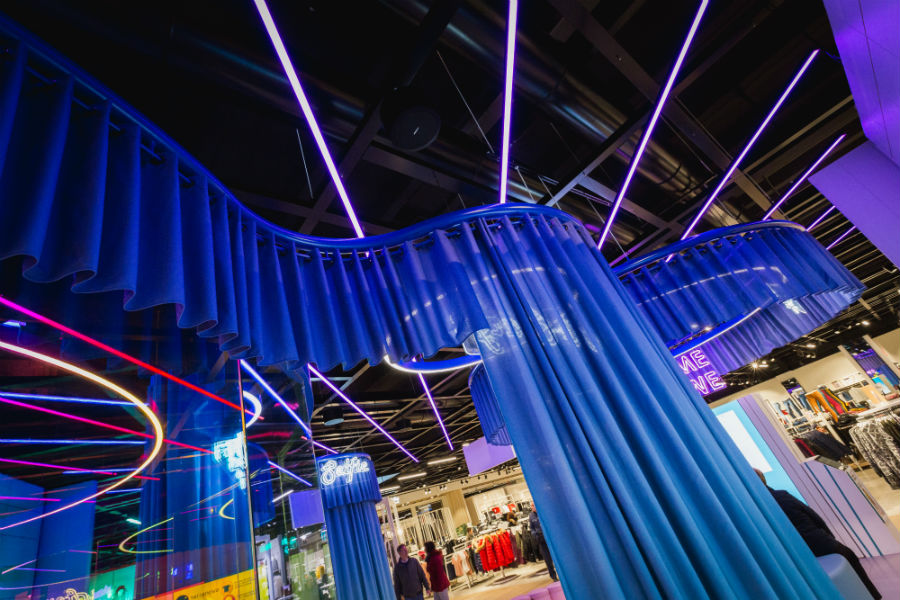
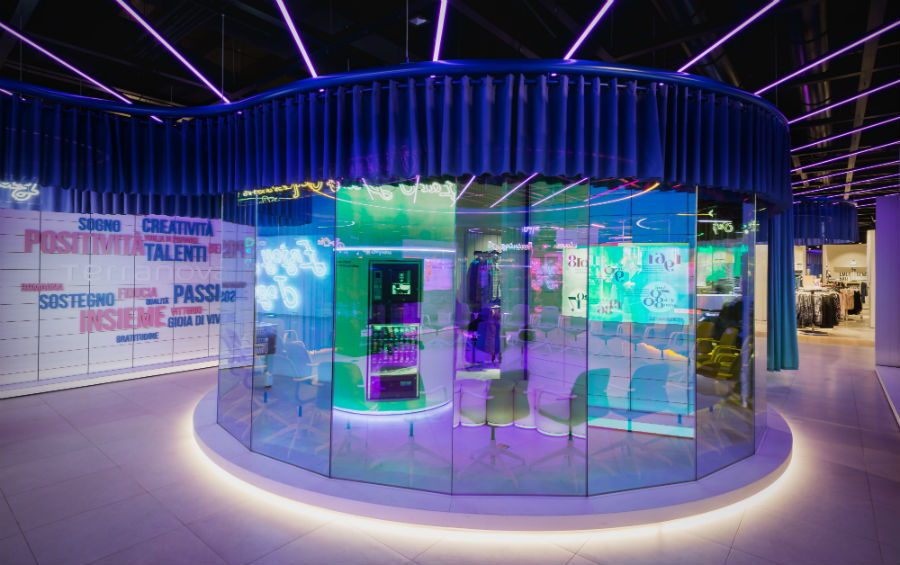
A ribbon curtain subdivides and unfolds the space by following curvilinear geometries.
At the centre of the space, a tank-meeting room made out of dycroic glass panels hosts the staff training activities as well as special events. The glass produces manifold reflections of the neon lights set within and around it.
The rest of the area offers a charging station for mobiles and tablets, a corner to shoot selfies, a vending machine for food and refreshments, a foosball table and a lounge for video projection.
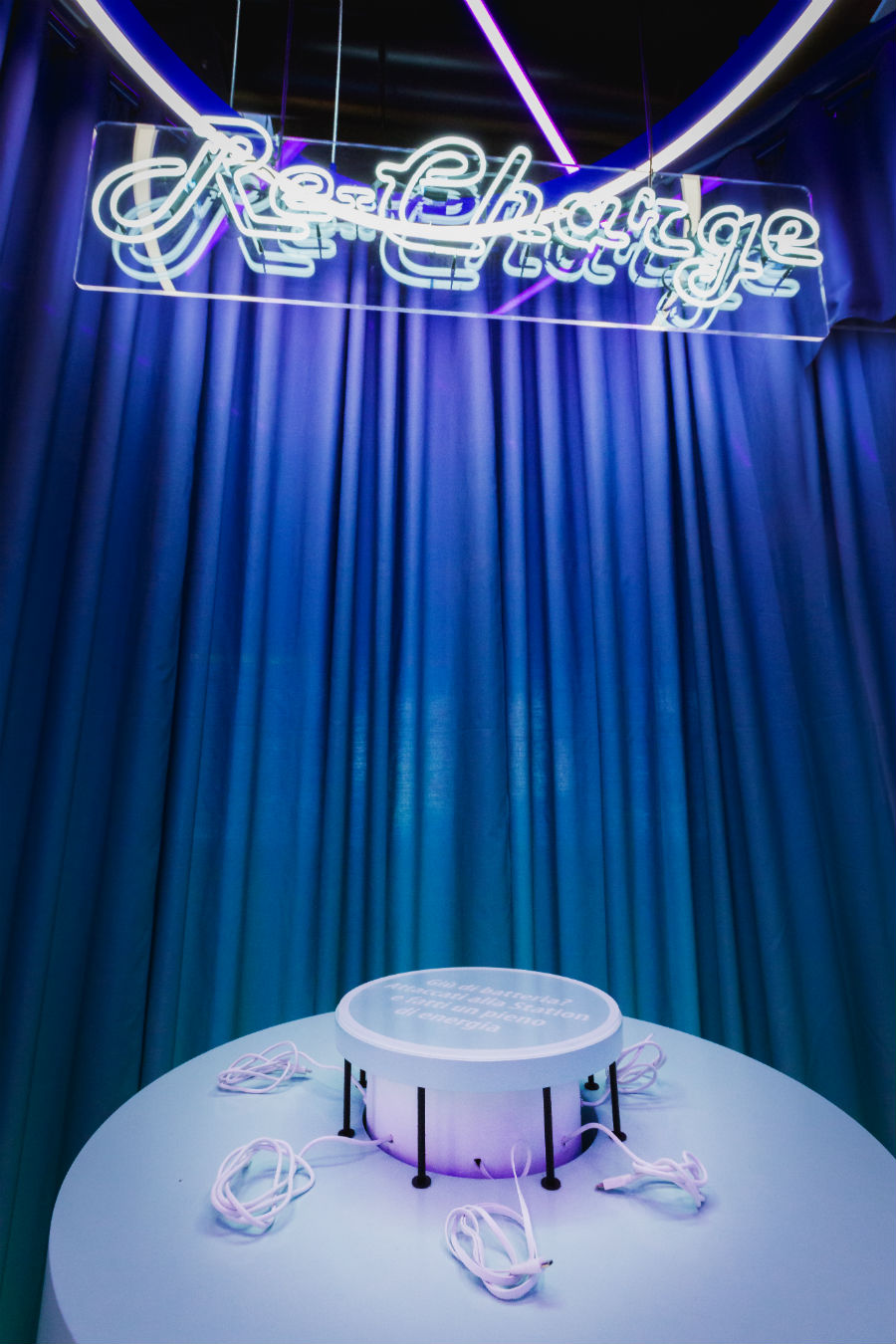
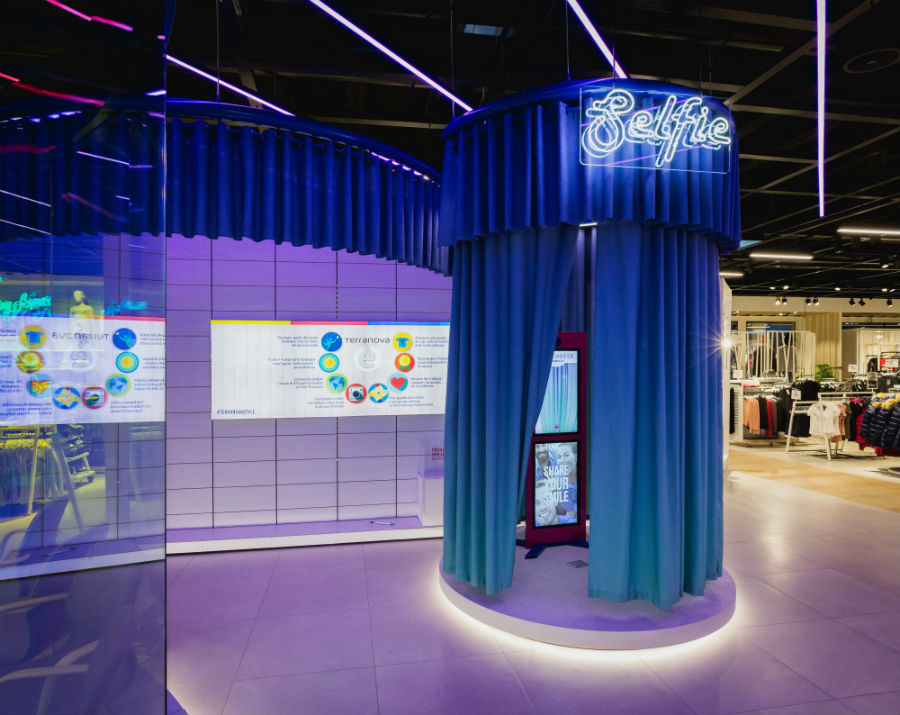
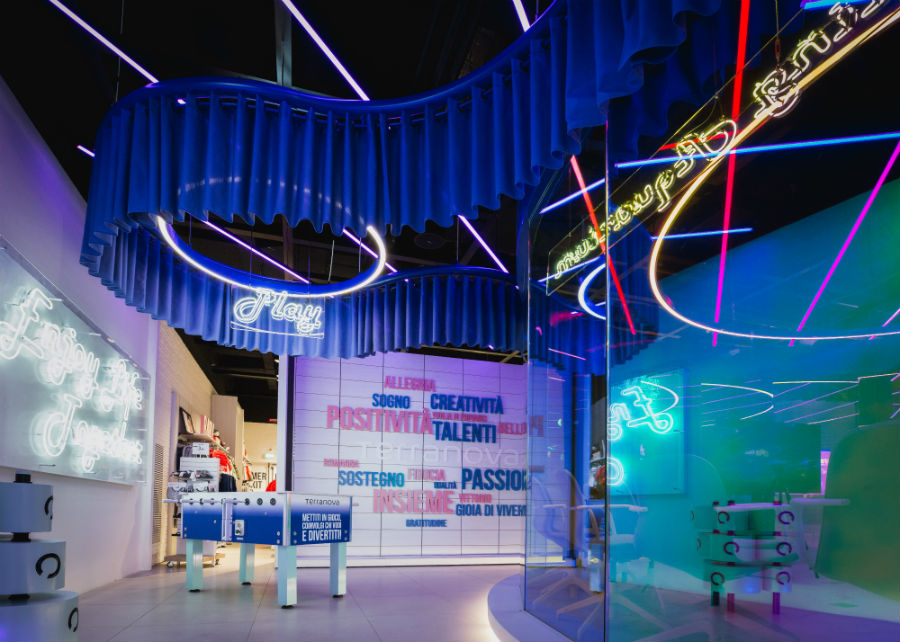
2. Interview with Marco Vanucci, designer of the innovative Terranova Island
We interviewed Marco Vanucci, the architect who, together with his team, designed the concept of the Terranova’s training centre. Besides telling us about T-Island, we asked him a few questions about his vision of today's architectural scene.
1) What was the most significant experience or the most specific interest over your formative years?
I started studying in Florence at the end of the 1990's coming into contact with the great Italian Modernists (Michelucci, Savioli, Ricci, etc.) and the 1970's radical Movement (Sperstudio, Zziggurat, Pettena). My passion drove me to complete my studies in London at the Architectural Association, where as a matter of fact I'm now teaching a course.
After my degree, I worked for Zaha Hadid Architects, where I deepened and put into practice my passion for parametric and digital design. Then I worked for AKT2, an engineering consultancy, where I was involved in many projects in London and all over the World.
The interest for the study of form, its creation process and its performative aspects, along with the theory of systems, cybernetics and so forth to computation, firstly through studying at the AA then working for the Hadid Studio, have left a deep mark in my way of understanding space and my architectures.
2) Which aspects make up the characteristic features of your design?
I founded OPENSYSTEMS Architecture in 2012 with the clear purpose of making the most of the experience I matured over my formative years. More specifically, the vision of OPENSYSTEMS is to conceive Architecture as a system in which all aspects - technical, programmatic and functional - merge and create an elegant project synthesis.
3) In your opinion, are there any trends today that can translate into new opportunities for store design? (also with regard to specific sectors such as materials, lighting...)?
The retail sector is undergoing a profound transformation. Under the pressure of the inescapable growth of e-commerce, thanks to which we can buy on-line without having to go to any shop, traditional commercial spaces provide a unique opportunity to come into contact with the brand and to offer a unique experience to one's own customers. This may concern the ability to purchase products in limited edition through "pop-up" spaces or to consider shops as opportunities to organise events and encounters.
In this sense, from the point of view of architecture, store design represents a unique opportunity to experiment new ideas in terms of space, schedules and materials.
4) Regardless of the type of product on display, what elements should always emerge in a store through design?
In the T-Island project we had the possibility to bring forward some values that were not directly linked to business itself. T-Island is indeed a space where nothing gets sold but where the customer can interact with the brand and experience relaxation and fun. For these reasons we strongly focuses on the use of colours, fabrics, textures and lights in order to signal the presence of a different area and arouse users' curiosity.
One of the keys to design welcoming, stimulating spaces is to never take anything for granted, even the elements that are normally considered as "service": in T-Island, for instance, we were committed to designing everything: from flooring, to lighting, to interior signage.
5) Regardless of the specific features of a brand and its identity, what should design convey to the future visitor of a store or retail space?
Architecture has the capacity to stimulate senses and give a feeling of wellbeing to anyone making use of a given space. Good design always provides the opportunity to make us experience beauty. Beyond the specific business messages of a particular project, it is always important to conceive spaces so that they can contribute to improve the built environment and enhance the experiences we make have in it.
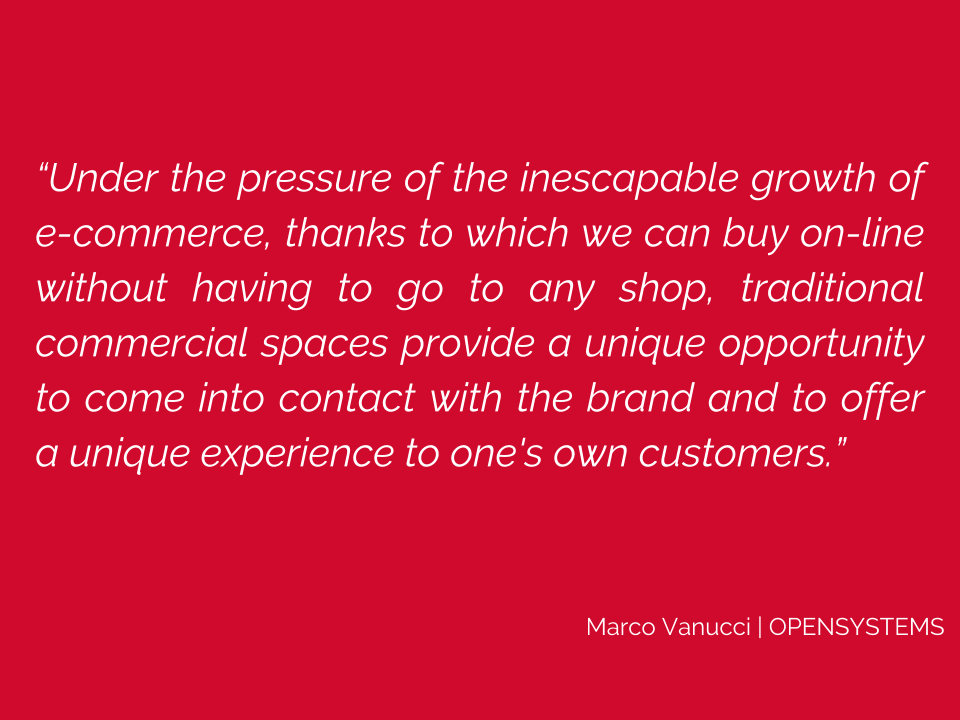
6) What inspired you while designing T-ISLAND?
The T-Island project interprets the spirit of the Terranova brand in an original, out-of-the-box way. This spirit gets its inspiration from the cheerful and positive lifestyle that is typical of the Adriatic Coast. This is the reason why T-Island is inspired by the colours and cheerful carefree atmospheres of the Romagna Riviera, by its evanescent, seaside styles of architecture, by its nightlife, clubs and its nonconforming, unconventional spaces.
7) How do you value your collaboration with Effebi Company?
The professional attitude of the Effebi team struck me very positively. Their capacity to understand the project and, in a very short time, to develop the different components while at the same time maintaining an excellent level of quality makes Effebi a more unique than rare excellence on the scene of retail design both in Italy and internationally.
8) Was Effebi of any help in solving some problems linked to your project?
Effebi provided help not only thanks to the very high level of its materials and human resources but also by contributing its long and valuable experience in managing complex and ambitious projects. T-Island was indeed quite complex given the use of a wide range of products and materials (glass, steel, wood, neon lights, soft furnishings and fabrics).
Effebi's ability to dialogue has greatly eased the task of solving even the most difficult details.
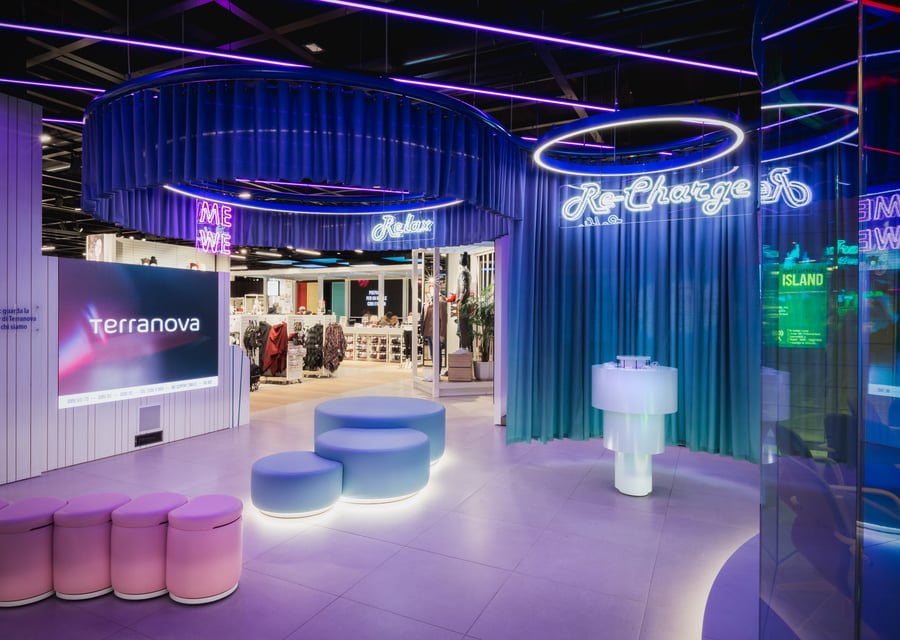
3. Some information on the Teddy Group
Terranova is a fast fashion low cost Italian brand, oriented to a young trend-sensitive urban target. The brand was launched in 1988 and can now boast an international presence.
Terranova is a strategic brand of the Teddy Group, a company founded in Rimini by Vittorio Tadei in 1961 and now a benchmark for the entire retail sector. The Group is present in Italy and abroad with four brands and closed the year 2017 with 644 shops in 42 countries (Terranova has 203 shops in Italy).
Thanks to its ability to meet the needs of its customers throughout the world in an excellent way and address evolving markets as well as the challenges of the digital transformation, the Group ranks among the leaders of the Fast Fashion markets.
The importance of customer experience
The Teddy Group has always been committed to placing the customer and his/her shopping experience at the centre of its company mission. Each point of sale has been conceived with the intention to facilitate purchases by helping customers to always find what they are looking for, while at the same time delivering a strong emotional experience inside the store.
In our present-day context, these aspects prove crucial and can spark new opportunities. Indeed nowadays changes happen very fast, consumers are less faithful and always attentive to new stimuli.
The presence of the digital world, an ever growing part of our daily lives, will influence consumers' behaviours. So the Teddy Group, being aware of the transformations of purchasing dynamics, is constantly at work to offer its customers a unique shopping experience, both online and offline, as part of its omnichannel strategy.
4. Conclusion
For the creation of Terranova's training centre, a fully innovative space inside the Pesaro store, Effebi was selected as partner for producing and fitting bespoke furnishings. The job was rather a complex one, mainly for two reasons: a wide range of materials and processing operations was involved and also because everything was to be produced on a tight schedule.
Architect Marco Vanucci's words and own satisfaction make us proud of what we have achieved and we can well say that over the years we have acquired some specific design, production and organisational skills aimed at creating bespoke spaces that can meet any requirements from customers.
And the T-Island project is a good example to add to our proven track record.
 previous news
previous news





